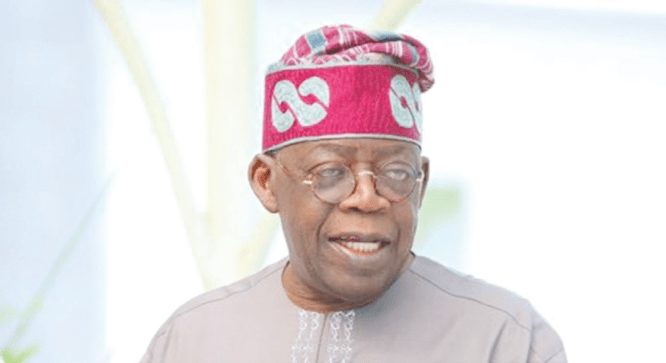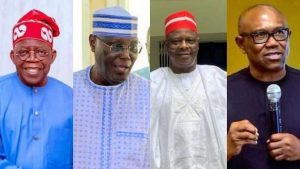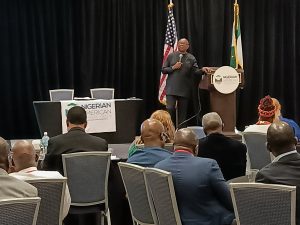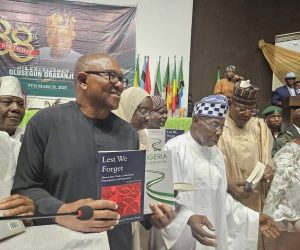PDP ran 16 years of irresponsible govt says Tinubu

National Leader of the All Progressives Congress (APC), Asiwaju Bola Tinubu has described the 16 years (1999-2015) during which the Peoples Democratic Party (PDP) ruled Nigeria, as a period of irresponsible, spendthrift governance.
Tinubu stated this yesterday in Abuja at the public presentation of “The Challenges of Good Governance in Nigeria,” a book written in honour of Chief Bisi Akande, the pioneer Interim National Chairman of APC and former Governor of Osun State.
The former Governor of Lagos State who bemoaned the challenge of governance in Nigeria even before the rebirth of democracy in 1999, described the period of military rule as one in which few people benefitted unduly at the expense of the majority.
According to him, not much changed with the return of democracy as the then ruling party failed to fulfil the dreams and aspirations of the people.
“This process went on for years. It distorted our society. Our institutions became so corrupted that they often worked against their stated purposes. Vice became virtue. Governance turned into misgovernance and then misrule. Wrong became right.
The social contract at the core of our collective existence was being disregarded if not discarded, not by the people but by those who led them. But justice and hope do not disappear,” he said.
Tinubu recalled that it was that scenario that propelled the formation of the APC to correct the situation of poor governance in the country.
He, however, lamented that certain forces which preferred the old order still erected obstacles to good governance in the first four years of President Muhammadu Buhari, by enthroning reactionary elements – Bukola Saraki and Yakubu Dogara – as leaders of the National Assembly.
The situation, Tinubu said, created a sour institutional relationship between the presidency and legislature and hampered the delivery of good governance.
“You might recall that not too long ago the ability of this government to deliver on key aspects of its mandate was hampered because the National Assembly was controlled by reactionary elements that fought for business as usual and against reform.
“This situation has been corrected by the sovereign will of the people during the last election. What emerged is a new National Assembly leadership committed to progressive reform. As a result, we have seen the quick passage of the historic Deep Offshore (and Inland Basin Production Sharing Contract) Act, which substantially amended the financial terms of deep offshore oil production. Because of this, government will gain billions of dollars in new revenue to be used for the development of our economy, its infrastructure all for the ultimate benefit of the Nigerian people.
“This achievement is not an isolated occurrence. It is a harbinger of other reforms to come now that the president has a reliable partner in the current National Assembly. History will look back and record this as a key moment in our progress as a nation. However, this moment would not have been possible but for the formation of the APC,” he said.
Tinubu paid glowing tributes to Akande, describing him as a mentor and friend, without whom the emergence of the APC could have been thwarted by forces out to frustrate the birth of a new political order.
“I have had a chance to take a cursory look at the book. The author has identified challenges to governance which are institutional, psychological, political and economic. Many of the issues raised in the book are matters of the deepest concern to our party, APC, and of President Buhari’s administration,” Tinubu said.
In his remarks titled “The Value of Introspection.”, Vice President Yemi Osinbajo said deep reflection is crucial in political leadership and is the difference between transformational leadership and the banal.
“Anyone who has paid attention to Chief Bisi Akande and his political life will notice that he also observes that tradition of documenting his thoughts on governance, on the responsibilities of those who govern
So, you may have come across his books; “A Fresh Start in Osun State”, “Moving Osun State to Prosperity”, “The Inner Minds”, “The Drama of Fate”, where he reflects on the challenges of sub-national governance and his prescriptions based on his experiences.
“The deeply reflective style always endures and ensures that he always provides the personal human dance of fate and circumstances that attend all human effort in politics.
“A major benefit to society of the individual reflection of its leaders is that they explain complex ideas with their own peculiar wisdom and expression.
“So in trying to define this phrase that we use so often and we all seem to know what it is even without defining it, that phrase “progressive politics” or governance, Baba Akande simplifies it as a teacher would and I quote him:
“This tradition of converting the birthdays and celebrations of our leaders to moments of reflections is an important one and I urge that our tendencies continue to do so.
“I was privileged to speak on the subject of reforming our electoral laws at Chief Bisi Akande’s 70th birthday, how time flies. Every year since 2008, we devote the 29th of March to Asiwaju Bola Tinubu’s birthday to the Bola Tinubu Colloquium where we take as deep a dive, as a one-day event will allow, into matters of importance into governance or our political economy.
“It is the duty of leadership to continue to reflect, to write, to debate, the rigour of our thoughts and ideas and the discipline of execution that will lift our people from ignorance and misery to wealth and prosperity,” he said
VP Osinbajo noted further that, “A tradition of our political tendency is that of introspection or reflection. By our tendency, I refer to that established by Papa Obafemi Awolowo, which in spite of its various iterations and versions, we all agree to describe as progressive politics.
In response to the eulogies heaped on him, Chief Akande expressed appreciation to the author of the book, saying it couldn’t have come at a more auspicious time than now when Nigerians want to ensure that good governance thrives in the country.
Akande described low quality of education as the greatest obstacle to good governance in Nigeria.
According to him, education remained the most important key to unlock human potentials.
“In Nigeria today, however, the numeracy and literacy contents of our education is too low compared with those of the people that once colonized and amalgamated our various communities into what they christened as Nigeria over a century ago.
“Our knowledge of science and technology remains so perverted by our low education that while the global economy is being driven by technology, industrialization and hardworking, Nigerian economy is largely being driven by prayers, rituals, and miracles.
“The truth is that the most potent and lasting miracles are found in workable planning-based accurate data interpretations, critical path analysis, and devotion to duties.
“Any country that fails to plan properly is planning to fail woefully. We therefore need to rework our school curricula, retrain our teachers and re-write our laws to give higher quality to our education. We must also reposition and re-restrategise our finances to spread the high quality of education to every corner of our country,” Akande said.
.








